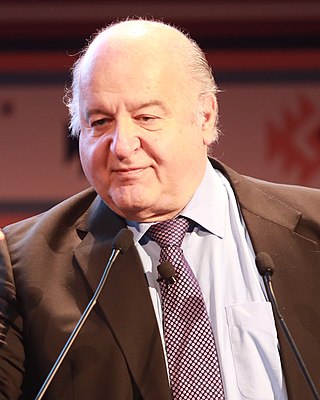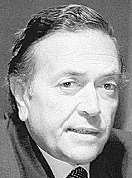The politics of the Republic of Peru takes place in a framework of a unitary semi-presidential representative democratic republic, whereby the President of Peru is both head of state and head of government, and of a pluriform multi-party system. Executive power is exercised by the President and the Government. Legislative power is vested in both the Government and the Congress. The Judiciary is independent of the executive and the legislature. The Economist Intelligence Unit rated Peru a "hybrid regime" in 2022. Traditionally weak political parties saw their support collapse further in Peru since 2000, paving the way for the rise of personalist leaderships. The political parties in the congress of Peru are, according to political scientist Lucía Dammert, "agglomerations of individual and group interests more than solid and representative parties".

The economy of Peru is an emerging, mixed economy characterized by a high level of foreign trade and an upper middle income economy as classified by the World Bank. Peru has the forty-seventh largest economy in the world by total GDP and currently experiences a high human development index. The country was one of the world's fastest-growing economies in 2012, with a GDP growth rate of 6.3%. The economy was expected to increase 9.3% in 2021, in a rebound from the COVID-19 pandemic in Peru. Peru has signed a number of free trade agreements with its main trade partners. China became the nation's largest trading partner following the China–Peru Free Trade Agreement signed on 28 April 2009. Additional free trade agreements have been signed with the United States in 2006, Japan in 2011 and the European Union in 2012. Trade and industry are centralized in Lima while agricultural exports have led to regional development within the nation.

The Peruvian Armed Forces are the military services of Peru, comprising independent Army, Navy and Air Force components. Their primary mission is to safeguard the country's independence, sovereignty and territorial integrity against any threat. As a secondary mission they participate in economic and social development as well as in civil defense tasks.

Alejandro Celestino Toledo Manrique is a Peruvian former politician who served as President of Peru, from 2001 to 2006. He gained international prominence after leading the opposition against president Alberto Fujimori, who held the presidency from 1990 to 2000.

Alberto Kenya Fujimori Inomoto is a Peruvian former politician, professor and engineer who served as President of Peru from 1990 until his downfall in 2000, though de facto leadership was reportedly held by Vladimiro Montesinos, the then head of the National Intelligence Service. Frequently described as a dictator, he remains a controversial figure in Peruvian politics. He was sentenced to 25 years in prison for human rights abuses during his presidency but was released after 16 years on 6 December 2023 following an order by the Constitutional Court of Peru.

Land reform is a form of agrarian reform involving the changing of laws, regulations, or customs regarding land ownership. Land reform may consist of a government-initiated or government-backed property redistribution, generally of agricultural land. Land reform can, therefore, refer to transfer of ownership from the more powerful to the less powerful, such as from a relatively small number of wealthy or noble owners with extensive land holdings to individual ownership by those who work the land. Such transfers of ownership may be with or without compensation; compensation may vary from token amounts to the full value of the land.

Hernando Soto Polar is a Peruvian economist known for his work on the informal economy and on the importance of business and property rights. His work on the developing world has earned him praise worldwide by numerous heads of state, particularly for his publication The Mystery of Capital and The Other Path. He is the current president of the Institute for Liberty and Democracy (ILD), a think tank devoted to promoting economic development in developing countries located in Lima, Peru.

Carlos Ernesto Fernando Ferrero Costa is a Peruvian politician who served as congressman as a member of Perú Posible representing Lima from 1995 until 2006 and also served as the President of the Congress from late-2000 until 2003. He was the Prime Minister of Peru from December 2003 until his resignation August 2005. He belongs to the Perú Posible party. Before he became a member of the Perú Posible party, he was part of the Fujimorist Cambio 90 of Alberto Fujimori.

A self-coup, sometimes known as the Fujimorazo, was performed in Peru in 1992 after President Alberto Fujimori dissolved the Congress as well as the judiciary and assumed full legislative and judicial powers. With the collaboration of the military, the Fujimori government subsequently began to implement objectives of the Green Plan following the coup.
The Commission on Legal Empowerment of the Poor was an independent international commission, hosted by the United Nations Development Programme (UNDP), and established in 2005 as the “first global initiative to focus on the link between exclusion, poverty, and the law.” Drawing on three years of research and consultations, the Commission proposed strategies for creating inclusive development initiatives that would empower those living in poverty through increased protections and rights.

According to the Organic Law of Regional Governments, the regions are, with the departments, the first-level administrative subdivisions of Peru. Since its 1821 independence, Peru had been divided into departments but faced the problem of increasing centralization of political and economic power in its capital, Lima.

Popular Force, known as Force 2011 until 2012, is a right-wing populist and Fujimorist political party in Peru. The party is led by Keiko Fujimori, former congresswoman and daughter of former President Alberto Fujimori. She ran unsuccessfully for the presidency in the 2011, 2016 and 2021 presidential elections, all losing by a narrow margin.

José Alberto Bustamante Belaúnde was a Peruvian politician. He was the 48th Prime Minister of Peru and Minister of Justice from 1999 to 2000, under President Alberto Fujimori.
Dead capital is an economic term related to property which is informally held, is not legally recognized, and cannot be exchanged for financial capital. The uncertainty of ownership decreases the value of the asset and/or the ability to lend or borrow against it. These lost forms of value are dead capital.

Women in Peru represent a minority in both numbers and legal rights. Although historically somewhat equal to men, after the Spanish conquest the culture in what is now Peru became increasingly patriarchal. The patriarchal culture is still noticeable. Contraceptive availability is not enough for the demand, and over a third of pregnancies end in abortion. Maternal death rates are also some of the highest in South America.

The National Population Program, known as the National Program for Reproductive Health and Family Planning from 1996 to 1998, was a project conducted in Peru in through the 1990s to reduce population growth as a way of meeting international demographic standards. Plans for the "total extermination" of impoverished Peruvians through sterilization were included in Plan Verde, a covert military operation created to establish a neoliberal military junta. Compulsory sterilization, which is a method that forces individuals to partake in sterilization operations, was the main method employed by the Peruvian government to decrease population.

General elections were held in Peru on 11 April 2021. The presidential election, which determined the president and the vice presidents, required a run-off between the two top candidates, which was held on 6 June. The congressional elections determined the composition of the Congress of Peru, with all 130 seats contested.

Alberto Fujimori served as the 54th President of Peru from 28 July 1990 to 22 November 2000. A controversial figure, Fujimori has been credited with the creation of Fujimorism, defeating the Shining Path insurgency in Peru and restoring its macroeconomic stability. However, he was criticized for his authoritarian way of ruling the country and was accused of human rights violations. Even amid his prosecution in 2008 for crimes against humanity relating to his presidency, two-thirds of Peruvians polled voiced approval for his leadership in that period.

Plan Verde was a clandestine military operation developed by the armed forces of Peru during the internal conflict in Peru; it involved the genocide of impoverished and indigenous Peruvians, the control or censorship of media in the nation and the establishment of a neoliberal economy controlled by a military junta in Peru. Initially drafted in October 1989 in preparations for a coup d'état to overthrow President Alan García, the operation was extended into the 1990 Peruvian general election and was reported to be subsequently executed under the government of newly elected president Alberto Fujimori following the 1992 Peruvian coup d'état. Shortly after the coup, Plan Verde was first leaked to the public by Peruvian magazine Oiga, with a small number of other media outlets also reporting access to the plan's documents.
Conservatism in Peru is a broad system of conservative political beliefs in Peru, characterized by support for Catholic values, social stability and social order. Peruvian conservatism has encompassed a wide range of theories and ideologies in the last two hundred years. In contrast with nearly nations like Colombia or Chile, Peru has not developed a concrete conservative political tradition.
















